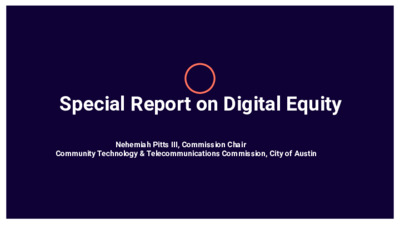Agenda Item 3e: Commission Special Report on Digital Equity — original pdf
Backup

Special Report on Digital Equity Community Technology & Telecommunications Commission, City of Austin Nehemiah Pitts III, Commission Chair Special Called Meeting - Special Conversation on Digital Equity On October 9th, 2020 the Community Technology & Telecommunications Commission convened a Special Called Meeting focused on Digital Equity. Serving as a culminating portion of Digital Inclusion Week 2020 programming and part of our CTTC 2018 - 2019 Work Plan to convene a Digital Inclusion Stakeholder Summit, this “Special Conversation on Digital Equity” included a variety of Austin residents receiving services, policymakers, and the community leaders of local nonprofits. The global COVID-19 pandemic has necessarily elevated the importance of Digital Equity and Inclusion conversations for affected communities and the leaders that serve them. The purpose of this convening was to allow Austin citizens the opportunity to directly communicate their lived experiences and persistent challenges with accessing internet-enabled devices and equitable broadband internet today. Following on previous meetings with local residents, community leaders, organizations, city staff, and local Internet Service Providers (ISPs), these citizen accounts and collaboration stories provide “challenge data points” for cataloging and potential resolution. The creation of a “Digital Equity Scorecard” or “Equitable Broadband Scorecard” has been discussed in prior partner convenings and should be considered by this Commission. Special Conversation on Digital Equity Speakers Community Entities w/Staff & Clients Texas School for the Deaf David Coco - Outreach Specialist Texas School for the Blind & Visually Impaired Daniel Wheeler - Instructional Technology Coordinator United Way of Greater Austin Paola Silvestre - Director of Family Pathways Delfy Morales - Client Marie Lord Ntetakou Youmbi - Client Mary de la Luz Reveles - Client Housing Authority of the City of Austin & Austin Pathways Catherine Crago - Head of Strategic Initiatives Brianna Sterling - Smart City Ambassador & Team Lead Josh Banks - IDADS Program Manager Chester Martell - IDADS Ambassador Austin Urban Technology Movement (AUTM) Michael Ward - Executive Director/Founder Special Conversation on Digital Equity City Participants CTTC Commissioners Sophie Gairo - Mayoral Appointee Nehemiah Pitts III, Commission Chair - District #1 - - - Malcolm Yeatts - District #3 - - - David Alexander - Vice Chair - District #4 Nicole Thompson Beavers - District #9 Sumit DasGupta - District #10 Elected Officials/Staff Council Member Natashia Harper-Madison - District #1 Eric Bird - Chief of Staff - District #1 Jennifer Stroble - Communications Director - District #1 Nicole Golden - Communications & Outreach Coordinator - District #9 City of Austin Staff Brion Oaks - Chief Equity Officer John Spiers - Program Director Jesse Rodriguez - Staff Liaison Francisco Gallegos - Program Coordinator Anilya Krishnan - Community Technology VISTA - - - - - - - - - Digital Equity Challenge Data Points Increased bandwidth requirements for deaf residents Inequitable bandwidth distribution for deaf residents - - - Website design and school learning platform accessibility w/screen reader tech for visually impaired - - - - - - - - - - - - - - - - - - Insufficient processors and devices for accessibility demands of visually impaired screen readers No universal screen reader standard Financial stability for low income residents Systemic barriers to career and education advancement for parents and kids Bandwidth sharing in the household due to distance learning Device sharing in the household Lack of culturally competent instruction for ESL primary caregivers Low bandwidth for multi-student families Digital skills training for parents and working student families Insufficient mobile wi-fi hotspots to make up for facility closures Insufficient hotspot bandwidth for common share wi-fi access scenarios Lack of culturally competent device training and resources (ESL, deaf, visually impaired, etc…) Lack of relevancy and trust in internet or tech companies Lack of familiarity with online resources to scale offline programs like IDADS Unreliable internet and digital systems Lack of affordable internet Lack of geographically equitable broadband Lack of cultural capital or diversity in tech industry Discuss this report and possible action at next meeting. Actions may include voting to collaborate on the creation of one or more of the following: Next Steps? 1.) Digital Equity Scorecard 2.) Equitable Broadband Scorecard 3.) Equitable Broadband Map (e.g SA)